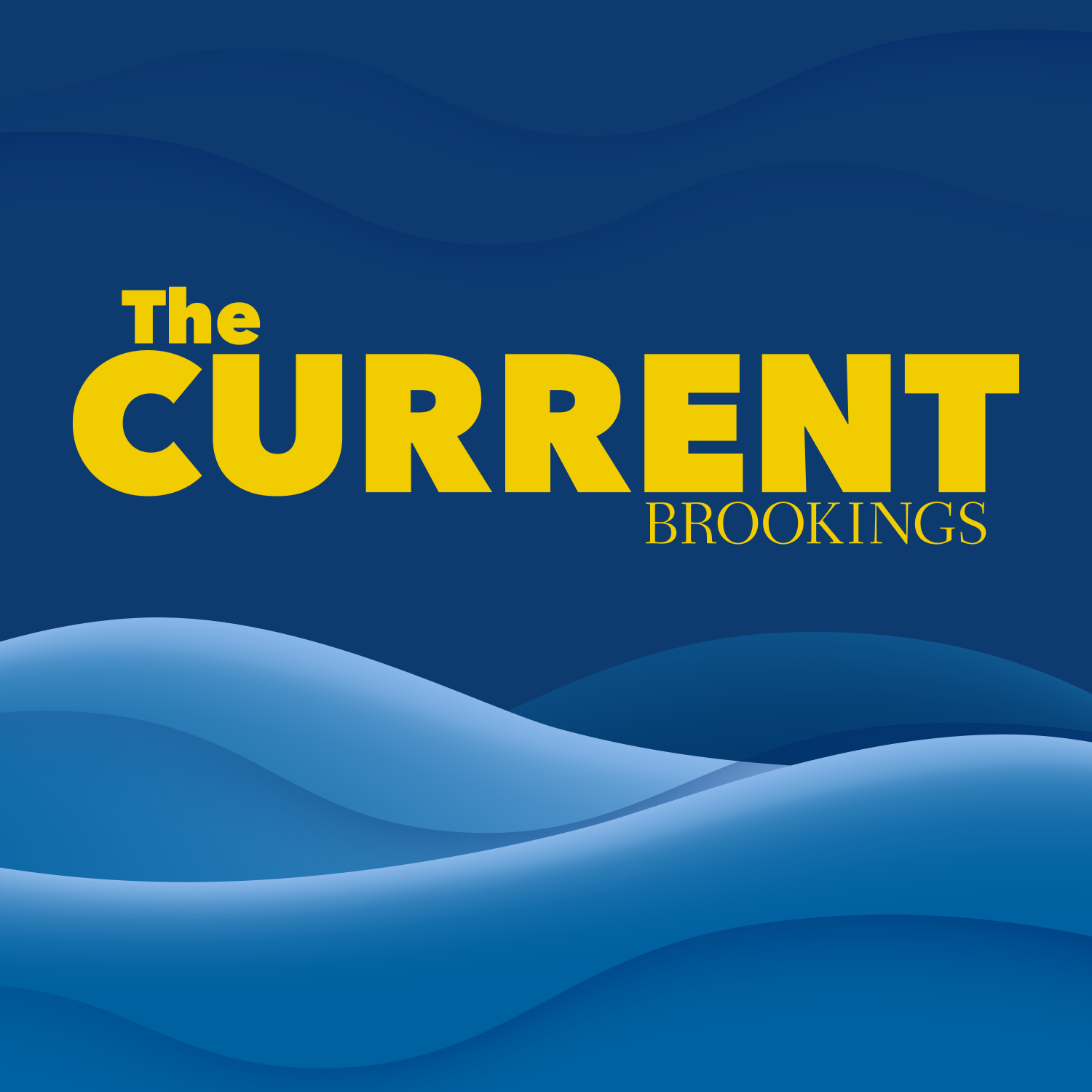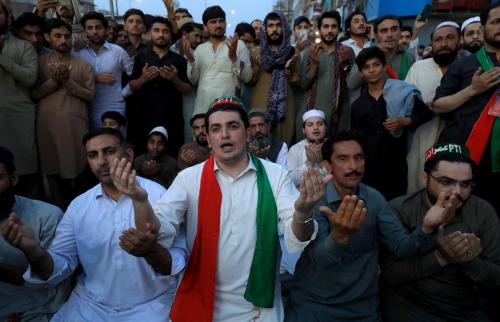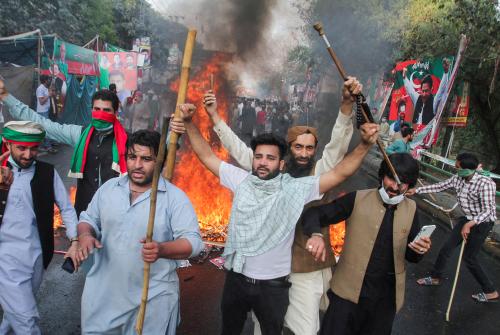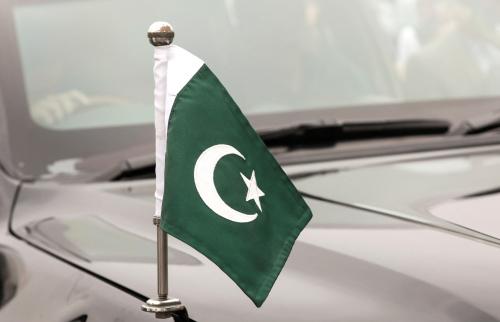This week, Pakistan holds national elections. Voters in the world’s fifth most populous nation go to the polls to elect representatives to Pakistan’s parliament, and from that, the next prime minister. To talk about what’s at stake for Pakistan, the turmoil surrounding some of the major candidates, and what the outcome could mean for the region and the world, Madiha Afzal, a fellow in Foreign Policy, the Center for Middle East Policy, and the Strobe Talbott Center for Security, Strategy, and Technology at Brookings, joins The Current.
TRANSCRIPT
[music]
DEWS: Welcome to The Current, produced by the Brookings Podcast Network. I’m your host, Fred Dews.
This week, Pakistan holds national elections. Voters in the world’s fifth most populous nation go to the polls to elect representatives to Pakistan’s parliament, and from that, the next prime minister. To talk about what’s at stake for Pakistan, the turmoil surrounding some of the major candidates, and what the outcome could mean for the region and the world, I’m joined by Madiha Afzal, a fellow in Foreign Policy, the Center for Middle East Policy, and the Strobe Talbott Center for Security, Strategy, and Technology at Brookings.
Madiha, welcome back to The Current.
AFZAL: Thanks for having me.
DEWS: So, can you set the stage for Pakistan’s upcoming election? The voting, as I mentioned, is for the parliament. The majority party picks the prime minister. Do I have that right?
AFZAL: That’s exactly right. Candidates run for parliamentary constituencies from various parties. And whoever wins the election is a legislator. And the party that wins the majority of seats gets to pick the prime minister. And it’s usually from the majority party. And if there isn’t a majority party, then the party that has won the most kind of seats will try to form a coalition, will cobble together a coalition with independents and other smaller parties. So, the smaller parties do become important.
And Pakistan has three major parties, which will field candidates in most, if not every constituency. There are about 270 constituencies across the country. The smaller parties may just field candidates in their provinces or in their regions, and a lot of independent candidates run as well, and so they are are important too.
And Pakistan has three main political parties that are at play in this election. The Pakistan Muslim League-Nawaz, led by Nawaz Sharif, who’s a former prime minister. The Pakistan People’s Party, led by Bilawal Bhutto. That’s the Bhutto family party now. And the Pakistan Tehreek-e-Insaf or PTI led by former Prime Minister Imran Khan, who’s currently incarcerated and in jail.
DEWS: All right, I want to pick up on that last point and ask you to talk a little bit more about those three leaders of those three leading parties. One of them is in jail. One of them is the, I think, son and grandson of former prime ministers. One of them is a former prime minister as well. Can you talk about the competition amongst these three and what it looks like on the ground?
AFZAL: Well, the Pakistan Muslim League-Nawaz, led by Nawaz Sharif, he’s a three-time former prime minister; the Pakistan People’s Party, led by Bilawal Bhutto, as you mentioned, he is the son of former Prime Minister Benazir Bhutto and the grandson of former Prime Minister Zulfiqar Ali Bhutto. Those two parties had been sort of Pakistan’s two major parties. They had alternated power with each other in the 1990s, and then again in 2008 and 2013.
In 2018, the PTI, which had become the third largest party in Pakistan, led by a former cricket player, Imran Khan, it had become the third largest party in Pakistan in the 2013 election, and and became the largest party and won election in 2018 in an election that was tilted in favor of Khan and against Nawaz Sharif. The tables have turned this time around. So, this is an election which is tilted against Khan and in favor of Nawaz Sharif.
Prior to the 2018 election, Imran Khan, the playing field was kind of cleared for him and Nawaz Sharif was incarcerated in jail. You see the exact opposite right now. Sharif, who had sort of convictions against him, those convictions were overturned in the run-up to this election. He returned from exile last October. He had actually been disqualified for life from running for election. That disqualification was overturned last month, and he is basically now … his party is the front runner.
On the other hand, Imran Khan has been in jail since August and just last week received three different prison sentences in three different cases and he has more than a hundred cases against him. And the timing of those cases and the convictions, the sentences, are really no surprise. Because Imran Khan basically had a falling out with Pakistan’s military. This is sort of the, you know, the usual par for the course prior to the Pakistani elections. He had had a falling out with Pakistan’s military because of a number of issues a couple of years ago.
But since that falling out, he had really taken on a zero-sum confrontation with the military, and his party now has been largely sidelined, so much so that you will not see the name of the party and the symbol of the party on a ballot. So, those candidates who are affiliated with the PTI are running as independents.
Nawaz Sharif’s party is a party that is from the Punjab Province, the largest province in Pakistan. You really need to win Punjab in order to win Pakistan. And, he is sort of a pro-infrastructure spending, building roads, bridges, rapid transit, pro-business candidate. And his brother actually had been a prime minister in sort of this interim period between 2022 and August 2023, kind of paving the way now now for Sharif.
The last thing I’ll say about the PPP and Bilawal Bhutto is that it has become a party largely relegated to the Sindh Province, which is the second largest province in Pakistan in terms of population. And the PPP is, you know, this is less part of the story right now, but Bilawal is trying to make a push for the party returning to national status, if you will. He was most recently foreign minister of Pakistan in this PLMN-led coalition government, foreign minister until August of last year and an effective one at that.
DEWS: I’ve read a little bit about how Imran Khan’s party, PTI, and people who are running under that banner are being sidelined. Now, is that being done by the military or by the government, or are those one and the same? Can you talk a little bit more about the role of the military in Pakistan’s politics?
AFZAL: Yeah, so that’s being done by what in Pakistan is called “the establishment,” which is really a euphemism for Pakistan’s military. In this, in the sidelining that has happened, Pakistan’s military had a very willing partner both in the PMLN-led coalition government that took over after Imran Khan in April 2022, and the caretaker government that is largely seen as being appointed by Pakistan’s military. That basically is the caretaker government in the run up to Pakistan’s election that has been in power since August of 2023.
So, the military has had willing implementers, if you will, and the judiciary has also, as it has many times in the past—you know, none of this kind of pattern is new—sided with the military.
What is important to note is while the pattern is not new, in the fact that essentially the entire senior leadership of Khan’s party has resigned from the party under pressure from from the establishment. They were jailed last year and basically it seems that one of the conditions for them being released from jail is resigning from the party and kind of resigning from active politics. So, the entire senior leadership of Khan’s party bar one or two people have resigned.
So, you have a new party leadership, if you will. But essentially, if people vote for people from Imran Khan’s party, they will be voting for Khan, even if he won’t be able to be prime minister because he’s currently disqualified from being prime minister.
The prediction, if one is to look at history, you know, the prediction is that Nawaz Sharif and his PMLN is likely to win power. The huge surprise, and for PTI it would be a miracle, would be if PTI-affiliated independents can can pull off a win.
DEWS: So, looking at this election, it’s coming up this week. As you just said, Sharif is probably going to win. PTI and Imran Khan have been totally sidelined. And yet you have the world’s fifth largest country, one of the largest democracies in the world, people heading to the polls amidst some economic problems, tensions with Afghanistan and Iran on its western border, border dispute with India, it’s had floods, it has inflation. What is the feeling amongst Pakistani voters about the health, or not, of their democracy given all these circumstances?
AFZAL: Well, I think most Pakistani voters will will tell you that Pakistan’s democracy is is badly damaged. Some will say, especially PMLN-affiliated voters will say, well, nothing is different this time around because this has happened in the past as well. Pakistan’s elections have always been managed. Pakistan’s military has always kind of determined the outcome.
But for the PTI supporter, for the Imran Khan supporter, many of them who are young, it’s sort of a new demographic that has, you know, it’s part of Pakistan’s sort of youthful population. Pakistan has a very young population. But it’s also sort of this middle class that is energized and certainly wants to, you know, supports Khan.
They will consider what is happening as something that is happening in a much larger degree to their party. And so, there’s a lot of grievance and a lot of anti-military sentiment that has come up there.
If you look at the Pakistani voter, you know, what does he or she care about? Well, the Pakistani citizen cares about the economy certainly, you know, soaring inflation. They want opportunity. But a vote for Khan or a vote for Sharif is not really going to be a vote on the issues. Ultimately, you know, it’s become a very politically polarized electorate, much like what we see here in the U.S. And they’re going to vote for their party even if what the parties might implement when they come into power may not be very different, right?
All of these parties have had, and these candidates have had, time in the past as prime ministers. And they haven’t fundamentally changed the trajectory of Pakistan and Pakistan’s place in the world in recent years. But the country is so politically polarized and ultimately the vote is going to be along partisan lines, such as there is going to be a vote, right?
So, there might be reduced turnout because of the crackdown on PTI and because of sort of the difficulty that the PTI voter has seen in terms of just even identifying their candidates on the ballot. There might be a reduced voter turnout because people may feel that this exercise doesn’t matter very much.
And in that sense, it’s hugely important because for the fifth largest country in the world with a large young population, hope in the democracy and the feeling that they have a say in the future of their country should matter. And there is an increasing sort of despondence or hopelessness in that already. And I think the way things go this week, the way things go on Thursday, will really determine whether all hope is lost or whether they can see a glimmer of hope yet.
DEWS: So, I think that speaks to the stakes for the Pakistani electorate itself. What do you think is at stake in the election outcome for the region that Pakistan resides in and also other powers around the world, including the United States?
AFZAL: Well, you know, in that, I would say we are likely to see very little change. There might be marginal changes depending on who wins, but ultimately Pakistan’s foreign and security policy has been controlled by Pakistan’s military, even though civilian governments which had exercised much more control on domestic policy, we have seen the the the military exercising control on foreign and security policy.
This election, the military enters in charge of Pakistan’s politics and its domestic policy as well. But on foreign and security policy, I think we can see the strong relationship with China continuing; with the U.S. the search for a new basis for the relationship after the U.S. war in Afghanistan, that continuing; tensions with Afghanistan and Iran as well.
With India, obviously the the tensions with India continue. And I think there is some hope for those who have observed this relationship for a while that Nawaz Sharif had enjoyed a relatively warm relationship with Prime Minister Modi the last time he was in power. And some hope that that might change the dynamics. And it could be that there’s some marginal change there. But from Pakistan’s perspective, after the 2019 revocation of Kashmir’s autonomy, Pakistan sees that as a huge hurdle to improving ties.
And so, I don’t think that we’re going to see any major shifts in Pakistan’s both security and foreign policy. You know, more of the same.
DEWS: Okay, well, let’s leave it there for now. Madiha, I want to thank you for taking the time to explain this very complicated situation to our listeners. It’s very insightful, and I encourage everyone to find you on our website and on social media to learn about what happened in the Pakistani election later this week. I also want to encourage listeners to find your book, Pakistan Under Siege, published by the Brookings Institution Press on our website.
AFZAL: Thanks, Fred.
[music]
The Brookings Institution is committed to quality, independence, and impact.
We are supported by a diverse array of funders. In line with our values and policies, each Brookings publication represents the sole views of its author(s).







Commentary
PodcastWhat to know about Pakistan’s turbulent national elections
February 6, 2024
Listen on
The Current Podcast